#Kant has a different idea though
Explore tagged Tumblr posts
Text
I’m half convinced Bison is gaslighting Fadel into thinking Style is flirting and into him.
But I am also convinced that Bison sincerely wants his brother to have some happiness - and not just because he wanted the freedom to flirt and date with Kant
The Heart Killers EP2
#and although Bison is slowly trusting Kant there is still hesitation from his part#but you can also tell Bison just wants to have so good fun at his young age of 24#he is not even looking for a proper bf and prefers to keep thing casual#Kant has a different idea though#I too will be flattered if I have a handsome tattooist flirting and paying attention to me non stop#kantbison#firstkhao#thk ep 2#the heart killers
26 notes
·
View notes
Text
Heart Killers time, woot woot!
I do have to say, watching what's happening with Jack & Joker right now, I hope people are not letting their expectations get ahead of them with this one either... though I know that's probably a futile wish. Expectation is such a thief of joy, y'all.
Anyway, my only expectation in this is I will have a good time, so let's do it!
How this man doesn't just expire from Bison doing this to him, I have no idea.

Oh, this line. Jojo knows us so well.

Ooh, we're having a black vs red debate!
In Bison's defense, he looks really good in red.
Something cracks me up about Kant looking for hookups at the bowling alley. Is that really good hunting ground? Maybe in Thailand? Definitely not in the U.S.
Oh Jojo, you bad, bad man.

I am gonna get full on obsessed with Dunk's tummy, aren't I?
Also just realizing how much of this show I am going to spend thinking how good the pairings of FirstDunk & JoongKhaotung could be...
Lolol, target acquired!
Ha, this is so me when a man tries to tell me what to do.

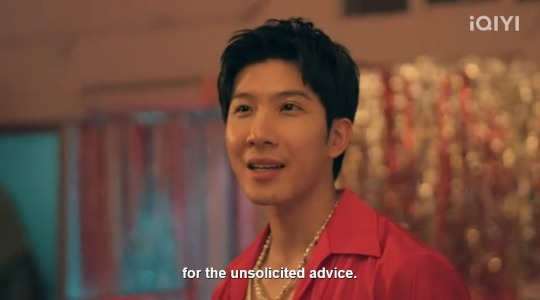
I like Bison being all "if you wanna fuck me, just say so". We have a very direct man here.
Nooooo, Style don't be a stupid driver.
I was not expecting an early Fadel/Style meetup! See, it's fate.
Way to make a horrible first impression Style! But I am loving how their dynamics are. Fadel is such a tight ass, it's gonna be great when he cracks.
Quite a first time scene for our boys! And people say GMMTV is gonna tamp down the gay, lololol.
Also can we take a moment to admire this shot? The red, the mirrors, there's a lot going on here. Beautiful.

I like that the burger uniforms are a mix of Fadel & Bison colorwise.
I also think it's hilarious that Fadel ordered black plastic gloves to maintain his aesthetic.
Omg, I am dying that Bison shot a gun at karaoke. He's a little disaster.
Hmmmm, mother? Interesting...
Ooh, silver fox alert!

Always appreciate some eye candy for us older fans.
Ah, of course the cop is a manipulative jerk. Hot, but a jerk.
Ain't this just a mood.

Heh, when the man you just had mind-blowing sex with turns out to be an assassin you have to stalk. If I had a nickel...
Oh, I think Style is gonna be my favorite. Dumb and chaotic.
As much as I enjoy a height difference couple, there is something about two men who are the exact same height...

Also love the black & white - because they are opposites!
Wait...does Bison not know how to cook burgers? Did... did he just put the raw patty on the board they use to chop veggies? Am I going to get stressed about food safety in this action romcom?!
I like that Fadel has this subtle air of general menace about him.
Aaaaah, bashful Bison is so cute!!!!! "Take me out...nooooo...really?"

This boy desperately wants to be loved. My heart.
Style is a slutty menace and I love him!

I also love that they are establishing the attraction is there before the deal gets made.
Ah, I was wondering if Kant was a philosophical reference!
Does Jojo have a "First eating burgers" fetish? That's been two extreme closeups in one episode. Just sayin'.
"Crazy and bold" is pretty spot on for Style!
Oh don't try to complain Style, you know you want him.
Ok, the yellow & purple... Are these their real colors, or the ones hiding their real colors as they embark on their mission?

Another costuming note - both Kant & Style had sunglasses as part of their outfits when they started their lying... love that little detail.
Good lord, that many beers and I'd be peeing every two minutes.
Oh! Fadel figuring out they're friends already! What a twist!
This was so much fun!
29 notes
·
View notes
Note
Thank you very much for your thoughtful answer to my ask! I enjoyed every point you made! I think your first explanation in particular (avoidance) was where my mind went, too. I thought in the reblogs maybe there was some confusion, so to clarify: I was referring to the scene just after Kant's woken up, when Bison flat-out asks him what's up with the ocean thing and Kant dismisses it as just a regular phobia. And that specificity is the main reason I suspect it will be revisited (not necessarily in any detail but I think Bison will find out), because they didn't need to include that brief exchange, but to choose to have Bison ask and Kant deflect, especially when it's something the audience has only just been clued in on... I don't know, seemed deliberate, but maybe it's wishful thinking cos I need everyone (both fictional and real!) to understand what my poor guy's gone through! (I still go back and forth on whether or not his dead parents will end up being connected to all the other dead parents! Can't decide, and can't decide if I want it or not!)
I might be partially responsible for the confusion, as I got carried away and referenced other moments in the episode, like all the Babe mentions or the safeword scene... sorry about that ^^" That being said, I think Kant's later talks and actions are very congruent with his first scene of the ep, hence the temptation to link the two. He's on an incredibly even keel for that entire episode! but that's not what you're talking about. (as an aside, I love that you summarized in one word - avoidance - what took me one rambly paragraph to express)
Man, I understand you so much about wanting everyone to know what he's gone through. I've spent all the earlier episodes wanting to grab Fandom by the lapels and shout don't you see how trapped he is??? Tbh even if he had never actually fell in love I would still feel bad for him. So yeah, I get it. If we see someone (Babe, Bison, Style, even Fadel, anyone!) get angry on his behalf, I will be so happy. And you're right that it feels deliberate that they chose to, like, adress it while not adressing it. But is it because they'll go back to it or was it simply to clue us in on his state of mind? No idea!
(for the whole dead parents thing... idk, a plane crash seems a very different m.o. than just gunning people down, so I would lean toward "unconnected." but I feel very neutral about either possibilities, though I think "connected" would be harder to pull off well.)
Closing this post with a picture of Kant being the little spoon, because yesterday my friend was saying "but when is it Kant's turn to be spooned and petted on the head and comforted?" and while I think the caretaker role was healing and comforting for him this episode, it does not mean that I don't want to see him being taken care of not like that Fadel! drop the gun!
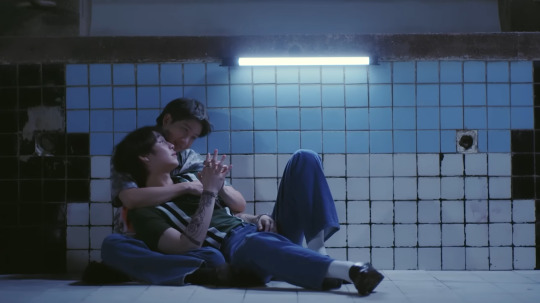
12 notes
·
View notes
Text
I ran across Ann Cahill when Julia Serano mentioned her in "Sexed Up", and the concept of Derivatization was honestly fascinating to me. I think Kant was a fucking loser and basing a feminist sexual ethic off of his work was probably one of the biggest mistakes feminism could have made. Like, he literally felt that any and all sex was de facto unethical. Why would you use that as a starting point. Jesus. (Both a swear and an explanation for why Kant was such a dipshit)
And like, Overcoming Objectification has a lot of really interesting ideas, but it's fascinating to see someone like...intentionally avoid developing them to their full explanatory potential? In essence, Cahill is anti-sex work. She thinks objectification is a shitty tool to attack sex work with, because she feels that the distinction between mind and body is artificial and fake. Everyone is a body who thinks, not a mind piloting a meat suit, and acting as though porn is bad because it values the meat suit over the disembodied soul who's the real you saddles your argument with the philosophical equivalent of a big glowing Zelda boss weak point. It also means that any time that someone is...you know, physically attracted to anyone else, then they're treating them like an animal or an object instead of what they should be treated like, which is a chaste 18th century disembodied mind.
And Cahill likes physical attraction! She likes sex! She doesn't want to give up her own sex life just so that she can tell other people what to do with theirs! But she does still want to tell other people what to do with theirs. And so she comes up with Derivatization.
And it's honestly a pretty solid concept. Like, in essence it's the idea that what's unethical and dehumanizing about situations we'd normally call "objectifying" isn't that you're being treated like a soulless sex doll, it's that you're being treated as derivative of someone else's fantasy as opposed to a separate, unique person. Like, she points out that in plenty of situations, people who are being "objectified" are expected to express quite a bit of agency, actually. She uses the example of a pornstar being expected to exclaim just how much she's enjoying what's going on, or a dominatrix having to fulfil a very specific fantasy for a male sub that is all, in his fantasy, an extension of her desires, even her absolute power over him, despite the fact that the specificity of his fantasy doesn't really actually leave her any actual choices of her own to make. Serano uses this concept to talk about the difference between attraction and fetishization, a use of it that is very solid, and frankly, her using the concept in a better way than Cahill does.
Because like, the thing about this is that Cahill doesn't actually want to work through the implications of this. Her chapter discussing whether men can be derivatized short-circuits hard, forgetting her own insight that someone can be derivatized for their agency, and uses the subjectivity running through most portrayals of masculine sexuality as evidence that derivatization can't be happening. She also seems to think that groups of women discussing and building a shared sense of ideal masculine sexuality is a fundamental impossibility in a patriarchal society, meaning that derivatization is kind of inherently and eternally one-sided. The book was written in 2011, so booktok wasn't a thing yet, but AO3 sure the fuck was so she's just straightforwardly not correct, even at publishing.
And like...it doesn't even do the thing it was supposed to do. It doesn't make a solid argument against sex work. Like, she basically just says, "Well, ethical sex involves both parties encountering an Other and adjusting to their uniqueness, and in porn, it's women just doing whatever men think is hot. AND THAT'S THE ONLY WAY IT CAN HAPPEN." Putting aside whether that's true--which it isn't--she's clearly aware that casual sex for fun and a job for money are different. So she comes up with these truly baffling metaphors.
She basically says that obviously, if she hires a lawyer to write a will for her, it's not happening because one person's whole self is based on just giving people money for legal documents and the other person's self only and exclusively enjoys writing legal documents for money. The fact that she's reductively engaging with the lawyer exclusively to fulfil her specific fantasy--of having a will that makes sense--isn't unethical...because the lawyer has skills that she doesn't have. She has money, the lawyer has expertise, so it's an interaction of equals! So in her mind, if there was a kind of sex work where the person was like "well, I'm horny but I don't know why or what I would do about it, I'll go and see a sex worker because they're the experts and I'll grow as a human being because of it." then it'd be fine.
Which, sure, that sounds like a fun little concept, if it wasn't the sole example of ethical sex work you were willing to accept. Then it sounds like a pretty impassibly high barrier, on purpose. And it's a ridiculous double standard, because that is not, actually, the only form of business transaction we consider ethical in our current society. If I had a lawn and I hired someone to mow it for me, I would not need to be sitting there staring at my overgrown lawn, flummoxed and frustrated, before calling the local lawn care experts, if I wanted the transaction to be ethical. Maybe I'm just fucking busy. Maybe I have too much money and also too much lawn. If I pay someone a fair wage to do something for me, and we both think "nice, good deal." Then hey. Ethics. Found 'em.
Like, I could rant about this book for hours, honestly, but this is already a staggeringly long post. And I do wanna say, I will still use derivatization as a term, I think it's got legs. Especially with the lens used by Serano, a much less sex-negative feminist. Like I've said before, everyone usually has a little bit of a point. Even if it's a good point made as part of a larger, pretty bad argument against something I think is fine.
22 notes
·
View notes
Note
Just wanted to speak up on your comment about The Heart Killers trailer being subpar from a trailer perspective--because I agree. It feels like a trailer made with intention that you already know a lot of context as opposed to being for someone who has no idea what's happening going in.
I watched it knowing that there was going to be some sort of Shakespeare interpretation and that it was likely going to be Taming of the Shrew; knowing that, a lot of the plot elements and dynamics came together more clearly in the trailer. If you had no idea, you'd be totally lost because it's using TOTS as a conceptual basis rather than something totally literal, and then it's also using that concept to jumpstart a rather big plot that isn't well explained. So much is happening that it looks like nothing is happening at all. Essentially, even though First and Khao may be representing the "secondary couple" of TOTS, the reason is because their characters are actually driving the plot. Jojo is using the scenario to jumpstart his story.
Lucentio and Hortencio are combined into Kant, who is initially less interested in ensuring he woos Bison/Bianca because he's in love and wants to court them like the original; rather his goals as a "spy" are the priority (ergo all those conflicted shots of Kant because he inadvertently fell in love in 0.5 seconds but still has a job). Bison is more central in wanting to play matchmaker for Fadel because he's invested in Kant (warping the "daddy won't let me" passive plot of the original into a more active "big bro won't let me (because we're assassins)" and creating a very different dynamic that we see in a few scenes; though Bianca is involved in TTIHAY to an extent). Kant's conflict between his job and his heart is probably going to take center stage in their portion of the story.
Joong and Dunk's Katherina and Petruchio have a dynamic more reminiscent of TTIHAY than the original TOTS with its intention to develop a genuine romance between Petruchio/Style and Katherina/Fadel and bring Kat/Fadel out of their closed off shell pretty clear and not...legit tame the shrew. And all of this is not even mentioning the dynamics arising from the practicalities of the assassin vs. infiltrators plotline (which was under-explained--like it seems like vigilante work given the context clues). "Trust" is probably going to be a strong theme across the board. Jojo, as you well know, has strong credentials in balancing drama with comedy, so I think this has a lot of potential. Everyone emphasized that this is a rom-com dressed as an action drama.
It's pretty clear to me that the four of them are going to be treated pretty equally (strong 4-person plot with lots of intertwining elements) and it seems like Aof weirdly even went out of his way to imply on Twitter that FK having strong scripts/characters was a priority for all of them.
Anyway, sorry for the long rant. I just wanted to put words to why you might be feeling the way that you did about the trailer and maybe even allay some fears. I never want to have too high expectations (I did the same with Only Friends lol), but I don't want to sell this short either.
okay so anon sent this back in April on the day of the lineup/THK announcement and I put it into my drafts with the intention to revisit it closer to the THK premiere date, but eventually forgot about it lol.
I didn't want to delete it however because obviously anon took some time to write this and it's intriguing to read. So in case you see this anon, thank you so much for this detailed analysis and sorry for letting it sit for so long, I think you're making some excellent points. I have not read the original TOTS but it's interesting to compare your notes to the final show and assigning the TOTS/TTIHAY characters to the ones in THK.
So I'm just gonna post this into existence for anyone who's interested - feel free to comment your thoughts below! 😊
xxx
#the heart killers#the heart killers the series#gmmtv#i have read some things about the TOTS characters but so far I cant see as many similarities as I thought I would#which isnt bad at all#just an observation
14 notes
·
View notes
Text
Are Logan & Janus Two Sides of the Same Coin?
In "Dealing With Intrusive Thoughts," it is revealed that Remus is Roman's "dark" counterpart. But who is Janus' "light" counterpart? It is certainly possible that he doesn't have one. But given how much emphasis is put into the symmetry between the "dark" & "light" sides (same number in each, black vs white clothing, etc), as well as the similarities within these groups (the naming conventions, for instance), it seems likely that Janus is somehow connected to one of the others. Following the example of Roman and Remus, both brothers are responsible for creativity, but Roman's creativity is deemed to be good and pure, whereas Remus' creativity is deemed dark and disturbing. Therefore, Janus and his counterpart would likely share the same fundamental trait as well, though their manifestations of it would be different. On this basis, I will argue that Logan and Janus are connected by the trait of reason, and that Janus is a "dark side" because he uses reason in a way that is cynical and self-interested.
First, let us compare Logan and Janus' style of argumentation. Logan typically references scientific studies and concepts, such as the Yerkes-Dodson Curve and the statistic about Christmas decorations that appears in "Putting Others First" to name only a few. This demonstrates his highly empirical world view, and from these empirical observations he draws normative conclusions about what Thomas ought to do. One of Logan's biggest emphases is on Thomas's health, as demonstrated in "Why Do We Get Out Of Bed In The Morning?"
On the other hand, Janus focuses on philosophical arguments, referencing Kant, Stirner, and Nietzsche to make his points. Though Janus is less interested in scientific facts, he still demonstrates logic in his own way, as these philosophers all used rational arguments to support their conclusions (note: whether or not you agree with them, what I mean by "rational" is that they applied the rules of logic to their premises to construct their philosophies). Janus has also been described as representing self-preservation, an aim not too dissimilar to Logan's goal of promoting Thomas' health. After all, Janus explicitly argued in favor of Thomas's mental health in "Putting Others First."
With all of this being said, it is worth noting that the flexibility and ambiguity of philosophy allows Janus to use logic as a tool to suit his needs in the moment. To put it in the words of Renee Descartes, "there is nothing so strange and little believable that it has not been said by one of the philosophers." Furthermore, "Selfishness vs Selflessness" draws attention to the contradictions between Stirner's belief in equality and his racism, suggesting that philosophers are often hypocritical and cannot necessarily be trusted. This is what makes Janus a "dark" side - he too has the capability to reason, but rather than pursuing the noble goal of truth, he uses his powers to manipulate others and further his own ends.
Given this reading, it is significant that in "Selfishness vs Selflessness," Logan is the one to mention Peter Singer, a contemporary philosopher. This further reinforces the hidden similarities between the two. Throughout the entire series, the only other side to use philosophical arguments is Janus, so for Logan to reference a philosopher in support of one of his own arguments suggests that he recognizes a certain logic to them as well (even if it is not his default method of logic). Moreover, Janus' adoption of the more science-based mental health rhetoric in the same episode shows that this parallel goes both ways.
This opens up a new avenue for speculation: who is Patton's "dark" counterpart? There are two possibilities: Virgil and the yet-to-be-revealed Orange Side. I will now discuss the evidence and implications of both:
Virgil: It is undeniable that Virgil and Patton share a unique bond. This can be seen throughout the episodes, and it would feed into the idea that Virgil is Patton's (formerly) "dark" counterpart. The trait that both share in common is feelings - while Patton's feelings are generally quite positive with some negative ones slipping through (see Moving on), Virgil is largely negative with a few positive emotions occasionally showing. However, if Virgil is the "dark" side of Patton, it is not clear what it means for him to have joined the "light" sides or what makes him special in that regard. Perhaps it can be explained as a result of Patton's morality -- he is ultimately who dictates which sides are good or bad, so if he took a personal liking to Virgil, he would see Virgil as good and thus Virgil would "become light."
Orange: Fans have speculated rather plausibly that the orange side will represent rage/anger, which would work well with this theory. This would be another instance of emotions "gone wrong" so to speak, as one emotion that Patton (and by extension Thomas) never seems to show is anger. Anger has a certain capacity for destructiveness, so this could be why the orange side is considered "dark." If orange was Patton's counterpart, this would leave Virgil without any counterpart, suggesting that he occupies an unusual role within Thomas' psyche and is perhaps the sole "neutral" side.
There is, of course, a third possibility: that orange & Virgil are counterparts, and that Patton is the one who is exceptional. Maybe Patton's role as the arbiter of morality means that he occupies a privileged position in Thomas's psyche which cannot easily be inverted (after all, what would be the purpose in a side that makes Thomas evil for no reason?)
Anyway, what do you guys think?
#sanders sides#sanders sides analysis#sanders sides theory#Sanders sides#logan sanders#janus sanders#ts sides#tss
20 notes
·
View notes
Text
Theory: Sigma's Identity is Lev Tolstoi
Decay of the Angels is a organization, equivalent of Russian literature in Bsd. There is something in the subtext that has been puzzling me since the first moment I saw Fyodor and Nikolai together.
Where is Lev Tolstoi in the BSD universe?
I thought for the first tims hat he would not be on the same side as Fyodor and Nikolai because of differences in philosophy and ideas, or that he would start on the same side and leave, etc. I was thinking about it, but Tolstoy did not appear in the story. So of coudse theory came to my mind.
Sigma, who is we don't know he's full identity" is actually Lev Tolstoi
I will explain everything in detail and at the end of these short paragraphs you will understand the logic of the theory. Now, I saw an idea at @bungoustraydogs-tr was written in just one sentence:
Sigma might be represent one of the building blocks of Russian literature, Gorky or Tolstoy.
is it possible ?
I think: (Drum voices)
He could be
Let's dive to the point. With his own words and writing, Lev Tolstoi is constantly searching for something that can be called internal and tries to understand his own self, why he is alive, what is being a god etc. He explains that he is trying to understand. He thinks day and night to prove to himself how the value of life is determined and the existence of the God he actually believes in. He is similar to Sigma, who does not remember his memories, does not actually have a sense of self, and therefore tries to understand the world he thinks he lives in. Tolstoy's sense of self was also undeveloped. At the same time, Sigma existed in the middle of nowhere, meaning he had no choice but to seek values, vitality, and purpose. He thought he had to follow the path given to him. To follow the path promised to him. Rules made by destiny , well, sound familiar to someone also to someone's characters . Tolstoi
At the same time;
"The view that knowledge acquired through reason leads to error helped me to save myself from the wrong path of indulging in unproductive thoughts. The certainty that knowledge of truth can only be found through life called me to doubt the correctness of my life. Despite everything, I was looking for God, I was hoping to find Him, and I was directing a prayer to the God I was looking for and couldn't find, as was the old custom. Sometimes I was weighing and measuring Kant's and Schopenhauer's facts about the unprovability of God's existence in my mind, and sometimes I was trying to refute these facts."
These are the sentences coming from Lev Tolstoi's own mouth.
Second thought for the theory;
When Sigma was born in the middle of nowhere, he had a ticket for a train that wasn't in the desert.Simple. Anna Karenina. Anna Karenina is a book that begins with children playing with trains, and the train has an importance that cannot be hidden in terms of the plot. Even though I haven't personally read it, I researched that trains were important to the book.

Second thought for theory;
When Sigma was born in the middle of nowhere, he had a ticket to take a train that wasn't in the desert. Simple. Anna Karenina. Anna Karenina is a book that begins with children playing with trains, and the train has an importance that cannot be hidden in terms of the plot. Although I haven't personally read it, I researched that trains were important to the book.
Thirdly, while thinking about religion and morality, Tolstoy, like most people, thought that the world in which a religious person lives was not the most important fact. He had no ambition, but he took good care of himself because he valued life. Sigma voided a gamble at Sky Casino, giving its customer a second chance. Sky Casino was life for Sigma and he nullified one of the game his customer play so Sigma think games aren't important as his customers views. In fact, the search for talent emerged in parallel with acquiring knowledge.
I can believe Asagiri doesn't want t add Tolstoy but after all the authors reveal in story.... Also Sigma isn't count as a villiain after all and Lev Tolstoi really want to see himself as a better person, this is kinda a obsession to him. So, this theory might make sense
#lev tolstoi#bungou stray dogs#bsd#bsd theory#bsd analysis#nikolai gogol#fyodor dostoyevsky bsd#sigma bsd#anna karenina
33 notes
·
View notes
Text

H E A D C A N O N .

She's a BOOKWORM ! Reading is an activity that's not only stimulating and relaxing at the same time, but can also be an avenue for KNOWLEDGE ⸺ and Jessica's always down to learn.

P A T H O S.
Her first nemesis is Morgan Le Fay, though Jess already knows about the woman from legends when she first encounters her. I feel as though she grew up reading FANTASY books, as most children do, and would dream about going on such fantastic adventures, about being rescued from her locked up tower like the princesses always are. . .

L O G O S.
Once she is awoken from stasis, Hydra manipulates her into believing that they are an organisation that fights for the rights of the little guy, taking down the evils of big corporations and others that wish to do harm. But, learning the truth about her captors and watching the terrorism they wrought upon others certainly brings the ETHICS they taught her into question once she escapes. Due to her extensive research to not only learn new, but also unlearn Hydra's lessons, Jess becomes quite knowledge when it comes to PHILOSOPHY. Kant's empirical self vs transcendental self, the concept of Dasein and specifically Heidegger's exploration of it, and a load of Sartre's teachings are some examples I can think of that would stand out to Jessica the most as she not only enters society after escaping, but as she explores herself for the first time as well. She also reads a good few basic biology and biochemistry books, mostly as an attempt to learn how humans actually work since she never learned ⸺ but also to find out how she differs from the rest of them. Her innate thirst for SCIENCE is always there, and early on it easily manifests through her choice to read these sorts of books. ( Yes her best friend is literally The Space Hero™️ and yes she may love Star Trek more than almost anything. . . No she has not read nonfiction books about space. "I've learned all I need to know about it through Carol and by going there myself. And that's more than enough, thanks." )

E T H O S.
It doesn't take long for her to get into mystery and DETECTIVE novels, quickly striking up a love for the genre. Agatha Christie novels in particular are her favourite, really enjoying any good whodunit? story. Reading these sorts of books is one of the things that initially puts the idea of becoming a Private Investigator into her mind. These days, her favourite remains detective novels ⸺ go figure. But other favourites include SCIENCE FICTION and ROMANCE novels. She doesn't mind the normal romances, but she'd prefer to have one with a vampire or something of the like in it. And, while she may not like being in space, nor care to read about the real life ins and outs, she does enjoy it as a background for her escapism. Also, I don't know where else to add this in but ⸺ you give her an instruction guide ? If she's interested in whatever the subject matter is, she'll read the damn thing cover to cover. Unless it's a MASSIVE manual, like the giant gd one for autoCAD ( i do not picture her using CAD btw it's just the first thing that came to mind hgjksdg ). She wouldn't read something like that page by page, c'mon now.

#i switched around those ethos and logos titles like 3 times#and it's easily the least important part of this whole post JGSDKD#anyway i'm glad to finally have written this down !#eventually at some point i wanna think of her fave books but like#that would mean i have to read and alas -#i am not the bookworm i once were 😔#i legit only read political science books and fanfic and comics these days#i am trying to work on this jgksdsl#ANYWAY#bbg enjoys cosying up with her coffee and a good book <3#( c h . s t u d y . )#( h e a d c a n o n . )
7 notes
·
View notes
Text
The sense of the term 'critical' used by critical ethnographers derives from Hegelian and Marxian philosophical ideas and their development by twentieth-century Marxists. As Lobkowicz (1967) shows, Marx adopted a view of the relationship between theory and practice, based on the writings of Hegel and Kant, that is quite different from what is found in earlier thinking about this issue. Thus, for Aristotle, practice was distinct from theory, and neither had much relevance for the other. They were concerned with different domains, the universal and the contingent. He believed that there is practical knowledge, but that this is necessarily only probabilistic and of uncertain validity; and it is directed towards the achievement of the good, not towards truth per se. Theory, on the other hand, is concerned with the contemplation of eternal verities and is of value in itself. There is an implied contrast here between the human and the divine (Lobkowicz 1977). Kant, however, identified the practical with the ethical, and thereby with a higher metaphysical realm which is quite separate from the reality dealt with by theory (in the form of natural science), and is necessarily unknowable in scientific terms (Kroner 1914). What we have here is in many respects an inversion of the Aristotelian view: the practical partakes of the divine, while theory deals with human experience. Hegel's contribution was to 'overcome' these distinctions by reintroducing Kant's metaphysical reality back into the world, and knowledge of it back into theory. He argued that the point in history had been reached (its end-point in fact) at which theory (that is, the ideal) and reality were reconciled. He believed that his own philosophy represented the world become conscious of itself. While, like other left Hegelians, Marx did not accept that this reconciliation had already occurred, he did adopt the view that history had arrived at the point where all the contradictions that had previously characterised human society could be overcome (that is, humanity could be emancipated and realise its true being). And he believed that the potential for that reconciliation was embodied in his own theoretical work. All that remained was for reality to come into line with theory, and this would be achieved through the development of the proletariat and its adoption of his 'scientific socialism' (and the social transformation that would ensue from this). What we have here is a teleological view of history as at least potentially leading towards the self-realisation of humanity, the actualisation of all that human beings have striven for in the past but have previously been unable to achieve. This view is central to the ideas of influential twentieth-century Marxists such as Lukács, Korsch and the Frankfurt School (though some of the latter, notably Adorno and Horkheimer, later became pessimistic about the prospects for emancipation). A crucial feature of this perspective is what is sometimes called negative critique: the criticism of existing social relations in terms of the ideal immanent in history; in such a manner as to stimulate the process by which ideal will become reality. This plays a particularly important role in the thinking of the Frankfurt School, for whom a key feature of advanced capitalism was an ideology that denies (on technical grounds) that social arrangements could be different. From this point of view, negative critique is, at the very least, an essential preliminary to bringing about emancipation. Indeed, it has been argued in relation to Horkheimer and Adorno that: 'critical theory had no active theory of politics and was left only with the notion of "immanent critique"' (Dickens 1983: 134). More sympathetically, we can see the Frankfurt theorists as seeking to keep critical consciousness alive at a time when, they believed, even the very possibility of an alternative socio-cultural order had almost been expunged (Buck-Morss 1979).
Martyn Hammersley, "Critical Theory as a Model for Ethnography", found in What's Wrong With Ethnography?
2 notes
·
View notes
Text
Thoughts on Kat x Dante and Kat x Vergil
I'm suffering through major writers block recently so to try and push myself out of this I'm going to write down my thoughts and hope that they are semi-coherent.💀
I adore a good love triangle.
I see Kat/Vergil and Kat/Dante as two different ship dynamics
Kat/Vergil - right person, wrong time
Kat/Dante - soulmates (whether platonic or romantic)
I am more preferential to Kat/Dante only because we see him actually begin to care for her more than Vergil seems to over the course of the game (if you've seen my blog you know the amount of Kante propaganda I post💀)
The events of the game:
In the beginning of the game, straight off the bat, it's clear Vergil and Kat are very close or "tight" as Dante so eloquently observes😂 Kat and Vergil work as a team. Kat is indebted to Vergil because he helped her out of a tough childhood. Vergil is indebted to Kat because she acts as his right hand. Although, there aren't many scenes in the game where Kat and Vergil are in the same room (much less, hold a conversation together) but we can still assume they're a team and generally like each other. Kat's closer to Vergil than any other member of The Order. Nice, okay...
But then, through the events of the game Kat and Dante have more scenes together. They talk, they trauma bond, and even though at the beginning Dante was weary of trusting Vergil or Kat, he seems to slowly come out of his shell with Kat and trusts them both because of it.
But the siege of The Order's headquarters is really when we get to fully see the "flip":
up until this point, Vergil seemed closer to Kat than Dante was (and perhaps Kat liked Vergil more as well) but the scales have slowly been tipping, increments of weight being adding in Dante's favor.
And then Vergil leaves Kat in the server room😭
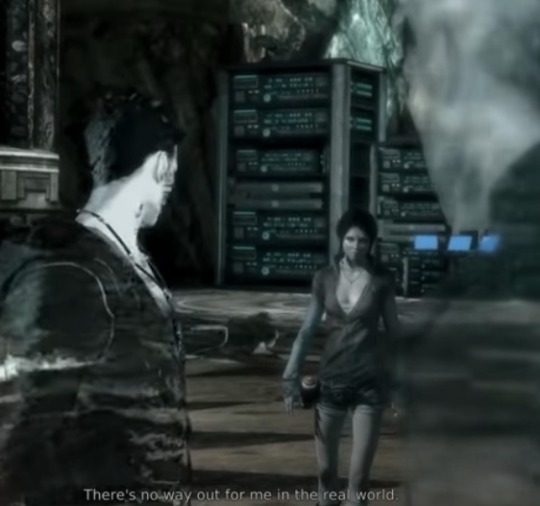
the thing most striking to me about this scene imo is that Kat just seems to accept her fate. She accepts that there's no way out for her and accepts her martyrdom for Vergil's cause because Vergil had so easily accepted it too... but Dante doesn't.
He stays with her. He tells her what to do and how to appear the least threatening to the feds. He assures her that he will be back for her even if no one else is.
He shows her a kindness, a thoughtfulness and it humanizes him in this scene.
Dante has to argue with Vergil to go back and save Kat. Dante changes their whole plan because he doesn't want to let this one human girl die. A far cry from the beginning of the game where he brushed them off and said he "preferred to work alone"...
After all this, even after Vergil reveals his plan to rule over the humans, Vergil still seems surprised (or regretful?) that Kat doesn't back him up, but now Kat knows that she can't support him anymore. Vergil is too far gone, too different from the man who saved her from her foster father.
I also just realized that we can see this somewhat mirrored in the framing of the cutscenes:
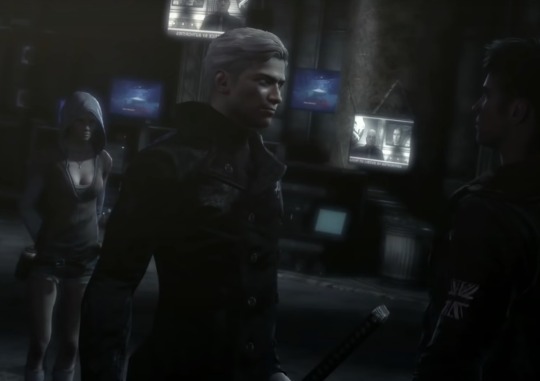


In most of her scenes with Vergil, Kat is pushed to the back. She's out of focus and otherwise not the main draw of the scene. In fact, it's very easy to overlook her in the shadows.

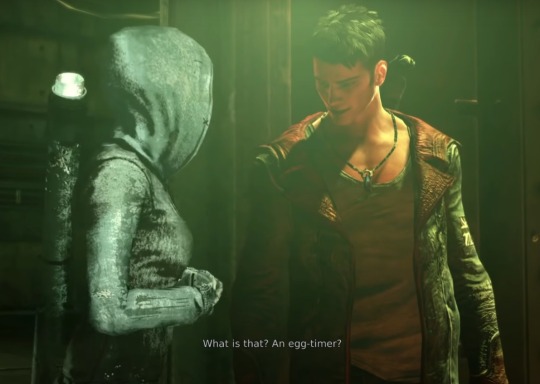

Whereas in most of her scenes with Dante, Kat takes up as much space on the screen as he does. She's harder to overlook now paired with that fact that she actually has lines in her scenes with Dante. (although this may just be confirmation bias given she has so many more scenes with Dante💀 I think it's a nice parallel)
Closing thoughts, I like both pairings although I feel that the game devs planed for Dante to be endgame. I still like the idea of a love triangle between the three; Dante and Kat close after Vergil's betrayal, Vergil and Kat as old friends turned sour (past crushes? the one who got away possibly?), and Dante and Vergil being brothers but also vying for Kat's attention (blood is thicker than water).
Anyways thanks for reading (or skimming) take this as a treat:
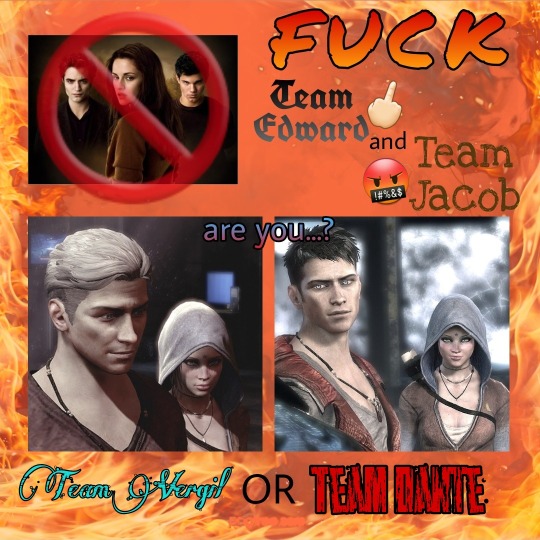
#tl;dr kat and her two boyfriends#dmc reboot#screaming into the void#dmc kat#devil may cry kat#dmc reboot dante#dmc reboot vergil#kat/dante#dante/kat#kat/vergil#vergil/kat#devil may cry reboot#reboot dante#reboot vergil
41 notes
·
View notes
Text

I've never felt like this before.
Pain had always been a companion of mine. It calms the demons, quiets the voice of descent, ceases the turmoil. Peace becomes obtainable in the chaos of war within my mind.
Something new has awoken in me - but it's already gone.
I moaned as you cut into my skin and drew blood from me to paint with. Panted as your knife dragged over my chest and lit my brain up with the knowledge of every kill zone it crossed. All you had to do was stop and plunge in and up to end my life in a slow and agonizing way.
Toes curled as I felt a sensation I've never experienced before in my life. I'd never know what it was if it wasn't for the copious amounts of dark smut I read out of sheer fascination. All those words now make sense, becoming a reality I never expected to experience. I'm struggling to reconcile my own self as you cut into me again, a sharp sting that travels deeper, lower, into my body that creates another involuntary moan.
"I'm having horrible thoughts at the moment," you say softly as you stare at my blood. I kant my head to look at you, chuckling under my breath with curiosity.
"Oh, yeah? Do share."
"I bet I'm making you moan more than he does. And unlike him, you'll feel every inch of me," your response comes out with a crooked smile, but your eyes show a sense of bewilderment and uncertainty.
I can't help but start laughing harder than I should, because you're not wrong. Any sexual experience I've shared has been with false moans and a will for it to be over much sooner than later. I have no sexual drive, never have, and I've made peace with that a very long time ago. I no longer shy away with explaining to people that not only am I non-binary, but I'm also asexual. You'll never have me lusting after you.
As laughter clears the air, there's a strained silence as I try to work through what's going on. Making eye contact feels like a weird idea, but I have to do it. What if I was wrong and I'm not actually ace?
"I probably shouldn't say this but... I'm really starting to doubt my own sexuality right now," I state gruffly and will myself to look at you, our eyes making contact. You hold it for a beat and pieces start falling into place. There's no drive to fuck you. No desire to climb ontop of you and find a release I've never wanted before. All I see is another person, my person whom I trust and care for, but no lust or desire to change what we're doing. I don't want you to touch me. No want for your lips on mine. None of these things I've read about that comes with this feeling explained in my books.
It doesn't change the fact that everytime you cut deeper than a mere scratch, the type I can feel my skin splitting apart, it zips lower to a place that has never reacted before. Now I have to do more research, though I already know that asexual still can have bodily reactions to stimuli and not a person. Out of all the dark, depraved, fucked-up violence delved onto my body, not once have I had this reaction. What the actual fuck?
Then my mind churns with the worry this will change knife play for us. I don't want it to, but you can't ignore an elephant in the room forever. Sooner or later it starts to stink and feel crowded. We've grown so much together and we've found another speed bump. I agree with me trying with someone else, see if I have the same reaction - but there are only two others I'd trust to do this with and they're not in our location. Guess we'll be traveling for science.
Even the next day my mind is reeling. The sensation stopped as soon as our scene was over. Sooner, really, if I think harder about it. It only came about as you were actively cutting me open and ceased when you switched to sensation play with the knife. I feel no different this morning than I did the start of yesterday. Though your question of if you could make me nut from cutting me makes me chuckle still.
The woes of self-discovery.

6 notes
·
View notes
Text
BRITNEY SPEARS CLONED AND REPLACED?!?!?!
By: Hydra 🐍
Looks like you fell into the trap of conspiracies with that title huh?
I would like to start this discussion with the quote provided by Bridle saying, “We’re all looking at the same skies, but we’re seeing different things.”

When I first read this, I was immediately transported back to a memory of visiting the 9/11 Memorial Museum in New York City. One of the “exhibits” (I put the word ‘exhibit’ in italics here because it feels wrong to describe these pieces as merely “art” on display for the public) was a wall filled with squares identical in size, yet significantly different in colour. The idea behind the installation is that many different people saw the sky that day, but all viewed it differently (almost exactly what Bridle mentioned in their quote!). Bob may have woke up, looked at the sky and said, “What a nice clear blue sky we have today,” but our perception of the colour blue may not be the same as Bob or anyone else for that matter.
I guess the point I am getting at here is: no matter what we are presented with, we will each perceive (insert item) in a completely different way, unique to our individuality.

Take Marcel Duchamp’s Fountain for example. Where I may be disgusted that someone has simply turned a urinal on its side, signed it, and called it “art,” someone else may view as beautiful; An everyday item that we don’t think to appreciate. If anything, the piece opened up major discussion of what “art” meant to each individual. Trust me when I say the artists and intellectuals of the world took little time to get their grippers on the “clearest” explanation of Fountain’s purpose and importance.
As an Arts and Humanities student (advanced at that! Thanks SASAH!) that feels the pressure of abiding to the intellectual lifestyle, I can’t help but call upon notable philosopher: Immanuel Kant. Kant has this crazy in depth theory about individual taste… but to spare some time, I will just bring up his critique of the aesthetical judgement. Kant’s critique states, “In order to decide whether anything is beautiful or not, we refer the representation, not by the Understanding to the Object for cognition but, by the Imagination (perhaps in conjunction with the Understanding) to the subject, and its feeling of please or pain” (OSU Library).
So what main stream, controversial, opinionated, subject can we apply all of this to??
CONSPIRACY THEORIES
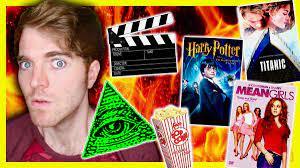
I’m going to bend Kant’s critique to fit my argument and you can’t stop me (!) because guess what? This is my post and you are simply a mere voyeur to my biases hehehehehe
Conspiracies are the ideal beautiful object in this scenario. We spend time listening to them and forming our own opinions on them (whether good or bad), not because of the “logic” provided from them, but because they free our imagination. They allow us to think and discuss beyond popular and imposed upon beliefs (I’m talking societies of control type shizzz), but all though we can express freedom of speech within this, it can lead to dangerous outcomes.
Elise Wang’s TED Talk “Why some conspiracy theories just won’t die,” describes the dangerous outcomes of conspiracy theories. Where one may think they are silly and lighthearted, another may use certain conspiracies to validate a negative opinion (Wang mentions violence and racism) to commit crimes. Do you remember that time a mob invaded the U.S. Capital because they believed that the Democrats were “rigging” the election against Donald Trump? Well the FBI considered that to be an act of domestic terrorism, proving that people act upon violence when applying specific conspiracies.
So what is the solution? Wang suggests that media literacy is the solution that has been proposed, but she does not agree with this. Wang says, “[...] being presented with information that contradicts a firmly held belief is more likely to back fire, making you cling to that belief harder than it is to change your mind” (4:56). When confronted with evidence that challenges someone’s beliefs, they will most likely respond defensively, even if it means ignoring or distorting evidence to fit their prejudgments. Instead Wang’s call of action is: work as an activist. Instead of falling down the rabbit hole of trying to debunk people’s theories (because at the end of the day we have realized media literacy doesn’t work), we must stop giving a platform to radicalizers (14:54). → “[...] proactively protecting the people that conspiracy theories target” (15:02). I agree with Wang in the sense that this has worked in the past. I hate to bring up Trump twice, but he did become a lot more irrelevant once he was put in time out and banned from Twitter.

You may be wondering how we went from talking about a urinal to serious societal issues, and I am also wondering the same…. I guess I am leaning into my yapper characteristics. Anyway’s with all this said, I hope Wang’s solution won’t prevent me from being provided with a good ole’ video about how Chuck E. Cheese reuses old pizza…

2 notes
·
View notes
Note
Can I rant for a minute about something non-royal related? I’m so disgusted by the behaviour of the RFU. I don’t know if any of you have been keeping up with rugby matters, but one of the England players alleged that a South African player was racist towards him during last week’s match. Videos of around the time of the alleged incident have been making the rounds, and what appears to have happened is during open play(!!!), an SA players shouts something in Afrikaans to his teammates which happens to sound a lot like an English swearword (which is not widely used in SA). Now people have been questioning whether this player can even speak Afrikaans (as he is black), which I don’t even want to go into the implications of that, but of course he can, as do most of the SA team to some level! World Rugby have had an independent review of the incident, and said there is insufficient evidence to lay any charges. Now the RFU puts out a statement condemning the (alleged) act, outright calling it racial abuse, saying they are angry that no “independent panel” will review it further (even though the panel that sought evidence was itself independent), and especially without clear-cut evidence still insist on calling the player a racist!! This while in the videos it seems very likely the situation was just misunderstood from a different language. I’m so disappointed. I must note that the England player was right in bringing the issue to the ref - if anyone feels they have been racially discriminated against they should - and I am absolutely against the online abuse that has come his way following the incident, but the SA player has had his reputation tarnished (especially by the English media) and it is serious allegations, and their take is just not it. The whole situation has had many people in SA (very randomly) say they can see why Harry and Meghan left because of the press. And although it has absolutely nothing to do with Catherine, as she represents the RFU, I do worry about the implications of her visibly supporting the RFU right now, so I hope she does not attend tonight’s match (I feel like she might be an easy target for some upset fans🙄). All that aside, I’m on Bongi’s kant (side) in this matter!
Ofc you can the asks are always open ♡
Dear god I had no idea about all this. But from what you told me and what I've read after a quick research, what I understood is that it was a misinterpreted situation which has turned into all this. So I totally see where you are coming from. Nobody deserves to be discriminated against but from what I understand it wasn't like that and just a huge misunderstanding which the media has done nothing but give more air too. And the people online ofc are being their natural hateful self and have dragged families into it too.
5 notes
·
View notes
Text
Trust the process.
a short THK fanfic
Turkish baths have their uses. They’re factory-like in ways he can’t quite explain, and suffocating, both literally and metaphorically – every room quick to make the doors disappear if you turn your back on them – but they have their uses. Kant should probably find a kinship with the place.
"So?" The captain asks.
"So I’m making progress," Kant replies. Sweat drips down his face, slow and unpleasant.
Why people sweat for fun is entirely beyond him: he’s rarely keen to do anything if the AC isn’t on, and his over-reliance on snake brand powder has his little brother calling him grandma and Bison nuzzling into his armpits – Bison likes the smell. He hasn’t said so, but he’s a show don’t tell kind of guy.
"That means you don’t have anything."
"It means I have his trust."
"So I heard."
Something icy slithers into the steam room, sliding up his spine, around his throat. He clears it, best he can: "You bugged the tattoo shop."
It’s not a question, not an accusation either. It’s nothing.
"For the biggest case of my entire carreer? Of course I bugged the tattoo shop. Don’t get all precious on me now."
Kant lowers the arm that had, without his imput, raised protectively to cover his chest.
"I must say, though," continues the captain. "Little Bison’s not quite what I expected."
Of course he’s not. His outfits seem almost designed to bring other scenarios in mind, of authoritative hands forcing young delinquents to confront their own inocence. Kant’s not opposed to that kind of porn, he’ll jerk off to anything, but he’s been the delinquent often enough that the whole thing has lost its mystique. Bison’s warm, awe-struck eyes at Kant’s pain, however? That’s something else.
And the captain heard.
No.
Listened.
"So what is this, exactly, Chris? Do you regret not taking me up on my offers, now that you’ve heard me moan?"
Kant’s on his feet, which is a bad idea – it doesn’t do well to tower over the man who has you by the balls. He hadn’t been too proud to beg when he had been caught red handed, wrist-deep in the wires of some billionaire’s car. He’d offered every services he knew how to perform, plus a few he had yet to learn. The captain had other plans for him, and not enough appetite to use and strong-arm him, but it still hangs between them, at least on Kant’s side: a distant, detached sort of shame. He hadn’t looked directly at it in years.
"Don’t be absurd," the captain sighs. "I’m worried about you."
It’s a new one, but Kant isn’t stupid: he knows a threat when he hears one. "Why?"
"Will you sit down? I don’t want a crick in my neck."
"You know I could do that kind of job with my eyes closed."
"I asked you to sit down."
The captain has the most unnerving gaze. It’s too soft, like his voice. He never, ever sounds unkind. Kant sits
"You think this is the first time I fuck a mark? I have it under control."
"But it can be intoxicating, can’t it? This level of trust."
"It’s what I do. On your orders, it’s what I do."
"I know."
"So what’s different?"
"You tell me," the captain almost smiles.
"Then I'm telling you: nothing’s different. You just hadn’t seen how I work before. If I don’t give a real part of myself, how can I expect anyone to take the bait?"
"Is it what’s happening?"
"You know I’m doing this for my brother." It’s the single dirtiest thing he’s ever done, bringing the kid into this. The cold feeling around his neck turns oily and viscous. Sweat. It’s just sweat. "You think I’d throw away his future for a pretty piece of ass?"
There’s a hand patting his tigh, right before the captain gets up.
"Alright, Kant." He always pronounces it can’t. "As long as you’re careful. Let’s say I trust you for now."
#the heart killers#mine#yeah I saw those 2 seconds in the trailer and immediately stilled like a pointer dog
8 notes
·
View notes
Text
… Carnap, as the fragment below makes evident, was not ultimately a utilitarian or even, perhaps, a consequentialist.
… What the present document makes evident, however, is that he saw inductive value functions, defined by axioms of induction and the choice of an inductive method, as partial value functions, i.e. as guiding choices only over a restricted range of an individual’s (or a society’s) overall priorities.
Opinions will differ about how to characterize the view Carnap sketches. … Still, it is worth noting that Carnap himself rejects a certain kind of consequentialism in this document:
Assume X is perfectly rational at time t and chooses action a in AX. Then it is nonetheless still possible for a not to be an optimum with respect to VX [X’s comprehensive value function]. It could be that an action a' is better than a with respect to VX, due to certain circumstances not known to X at the time of the action. It could even be that the objectively better, i.e. more successful action a' would not be rational for X. As emphasized elsewhere (§[26.IV]), rationality is not to be determined by success. (p. [10])
Carnap refers here to the passages from his 1963 replies regarding the use of experience in the choice of axioms for inductive logic, and of inductive methods, so as to ensure that the choices they lead to are rational. Here the analogy between the partial value functions bearing on the choice of inductive axioms and methods, on the one hand, and comprehensive or moral value functions on the other, becomes explicit, with respect to the relevance of experience to the respective choices. The analogy has limits; while instrumental rationality may constrain substantive (moral) rationality, in this view, it does not determine it; the “purely valuational” criteria Carnap invokes (p. [6] of the document below) ultimately govern the choice of values, and in this respect Carnap remains faithful to Kant.
The overall view sketched by Carnap has some potentially attractive features. It combines a Bayesian decision-theoretic rationality at the cognitive (or more broadly instrumental) level with a kind of minimally Kantian substantive rationality at the level of ultimate values, without claiming (like Kant and some later Kantians) to be able to determine a single, unique highest principle of morality. There is a striking parallel between this idea and the “relativized a priori,” as Michael Friedman has called it, of which different versions are suggested in Poincaré, Schlick, early Reichenbach, Cassirer, and Carnap. Just as (Kantian) unique synthetic a priori knowledge is relativized by these figures to different historical epochs or human purposes, so the (Kantian) unique categorical imperative is relativized by Carnap, in the fragment published here, to the many different fundamental values that prevail in different contexts and cultures. Not only does this conception leave room for value pluralism, then, but it clearly subordinates instrumental rationality to ultimate values in a way that has eluded some well-known attempts to conjoin these different components or levels of rationality.
Carnap’s strongest argument against deriving “perfect” rationality (at least) from successful outcomes comes in his final paragraph (though the connection is not made explicit):
“More rational,” whether applied to different periods or to two possible behaviors of the same person in the same period, cannot very well be exactly defined. Roughly speaking, a behavior is more rational than another when it comes closer to perfectly rational behavior. But since deviations from perfectly rational behavior are possible in completely different ways, e.g. in the ways mentioned above. . . and within each of these once again in different ways, it is hardly possible to decide without an arbitrary convention under what conditions a deviation in one way should be considered equal to a deviation in another way. (p. [10])
This impossibility of comparing, let alone measuring, different deviations from “perfect rationality” is in fact an immediate consequence of the sharp distinction between the criteria for determining instrumental (or partial) rationality from those governing substantive (comprehensive) rationality. If values are chosen by standards that are merely constrained (and not determined) by instrumental considerations, then distance from overall (“perfect”) rationality would be arbitrary even if (as Carnap did not believe) instrumental rationality were only a matter of learning from experience or of past success.
It is both surprising and admirable that Carnap was so bluntly honest with himself about the consequences of his conception of rationality. For of course he was notoriously an advocate of quantitative concepts; he thought that psychology, for instance, would have to become more quantitative to be more scientific. And we find him admitting, here, that a quantitative measure of moral value functions is not feasible. It is probably not an accident that this fragment ends where it does, or that it was not ultimately picked up again and worked out. For while Carnap was honest enough to put down the words just quoted, the conclusion expressed in them must have been unwelcome to him.
A.W. Carus, Introductory Remarks to “Value Concepts” by Rudolf Carnap
3 notes
·
View notes
Note
As a person who read the novel, whatever happens in ep3 is going to be the make or break. It feels like they changed it from the novel at the same time a bit nervous if they would go with it cause I don't want him to be that much of an asshole for no reason.It's why a lot who read the novel called him irredeemable. Even without this particular scene I feel like it could convey that he is not an angel. Novel Kant is definitely one of those toxic yaoi male lead- manipulative, wouldn't take responsibility, gaslights, a big red flag. Series Kant seems more well rounded
While I absolutely agree that this next ep will tell me what to expect from the show either good or bad thanks to the novel, it's definitely for different reasons. And I don't know how to go into why without heavily spoiling the novel, so anyone who doesn't want that, here's the warning.
I assume we're talking about Kant drugging Bison, yes? I think it's likely that will happen. I don't think it's nice, him doing that, but I don't really think it makes him a toxic yaoi lead either (I don't think he's the lead at all, actually, and I have to admit I'm a bit confused by what you mean by gaslighting and not taking responsibility. He's definitely a red flag but then again, they all are).
I just think he's morally grey. And honestly, unless these writers are hacks even worse than the novel writer, that's not going to change. It'll just be that the things he does in future will to help rather than hinder Bison.
None of these guys are good people. And maybe what Kant does goes too far for some for their own reasons. That's fine. My personal beef with the novel is actually Bison even though I have other issues, and that's for my own reasons. I can't tell you what to like or think and I'm not going to argue that you're wrong to dislike Kant. If the third ep does what you think and you can't handle it, then it's fine to stop watching. Not every show is for every person. I know I'm still watching with one foot out the door because as much fun as I am currently having, it could very easily sour. I also know that at some point I'm going to have to exit the tag completely even if I do stick around because fandom is notoriously bad at nuance and dealing with shades of grey when those greys don't come from a character they sympathize with. Only Friends taught me well, lol.
I do disagree Kant doesn't have a reason, though. I think the show, way more than the novel, has actually done a decent job giving us that reason. The novel made it mostly about money. The show has made it about Kant's freedom and being able to take care of one of the few people who we know he actually cares about. Maybe the only one, if you consider that he's siccing his best friend on a literal murderer without any information or warning (although to be fair to him he visibly did NOT like the idea of Style and Fadel actually getting together when Bison brought it up).
And we can think that maybe he's not telling him because he hopes that will make him safer or he just doesn't care, but I'm gonna say that we can't know because we have no window into what Kant's really thinking right now. Which maybe makes him harder to deal with for some people since we have some idea of where the other's heads are at based on conversations they have with each other. The very nature of what Kant's doing, though, means that even conversations he has about it with people he trusts can't be truthful.
The man said it himself: right now Captain Christ pretty much has his arm twisted up behind his back (and I can't help but wonder if he's going to twist harder in the next episode, but we'll see). It's what made him start this thing in the first place despite not wanting to and it's what's gonna keep him going even though he's probably going to start hating himself for it
I also have to admit to amusement that I already know that fandom is going to hate Kant a lot (and that we'll probably be getting think pieces about how much he doesn't deserve Bison well after the show ends) for doing what, in any other context, wouldn't be something to hate him for. These people kill people. "Bad guys" or not, they are out there murdering folks, sometimes with bonus honey trapping. And yet somehow it's the guy working to stop that that's the awful, no good, irredeemable one. I mean, I know why, but it's still funny.
But also, the novel was bad. I'm sorry, but it was. I hated Bison, and Kant was so obviously just Plot that I couldn't muster up the energy to feel anything much for him besides disappointment that this was the dude my favorite actor was gonna play. Thus far the show is a million percent better than the book in that regard - Bison is actually likeable, for one, and for another while Kant is responsible for moving the plot forward he actually has characterization, personality, and relationships beyond that. Part of that is the actors themselves, of course - Khaotung does charming very well and First couldn't play a flat character if he tried - but part of it is also the writing.
I'm still nervous - I've heard such conflicting things about how much of the screenplay the novel writer put into the novel itself and how much she deviated and I see a lot of differences but there are a lot of similarities too, so I can't help but be on edge. Also it's only ep 2 there's a lot of room for them to fuck it up, lol - but I'm trying to just take things as they come and not invest too deeply in anything so if I have to stop watching I'm not too bitter about it.
And well. I'm also maybe a little weird, because I love how cold and manipulative Kant is actually being right now. Mostly because it'll be that much more satisfying when he winds up getting bitten in the ass later. Also it just makes him and Bison more evenly matched, which I didn't feel they were at all in the novel - Bison was the amazing one and Kant was in awe so much that I just couldn't stop rolling my eyes. Seriously, by the end of the novel I had a headache. Their relationship was squicky to me for a few reasons, lol. We'll see how I end up liking it here.
In summation: I get it if you can't get past the drugging. Personally I'm not bothered (them having sex after did make me go eeech, but for me motivation matters, and Kant didn't actually drug Bison with the intent to sleep with him. The novel's approach to sex and kink is VERY old school yaoi with both couples. Not for me, but I also highly doubt the show will go that route. It's the one thing I'm pretty confident about although I guess as with everything else I could wind up being very wrong), but I can see why it would make Kant too unlikeable for you to root for. I just feel like this isn't something any of them would hesitate to do if it came down to it because all of these guys are sketchy as hell.
Thanks for the ask, non! If I didn't cover what you meant or you have more to say, please stop by again this is fun.
#personally i'm just floored they're letting kant be this cold#it'll make for a nice contrast when he really does wind up trapping himself#and will make it more fun once bison begins to suspect that poor unlistened to fadel was right all along#and starts playing the right game#(hopefully just when kant decides to stop because that's delicious)#asked and answered#spoilers
0 notes